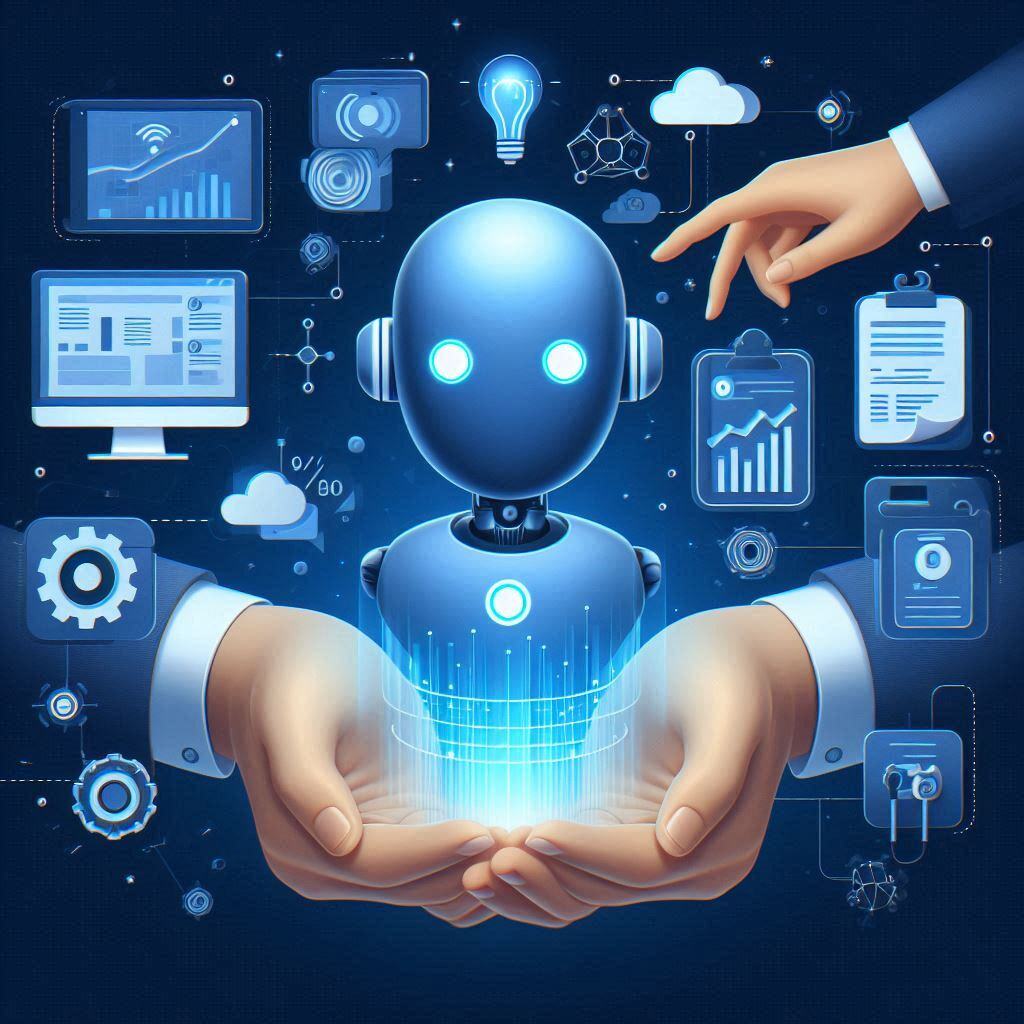AI Agents Explained: A Guide for Business Leaders and Innovators
Introduction As a business leader or innovator, you've likely encountered the buzz around AI agents. These intelligent software programs are changing...
Learn how enterprise agentic AI automates workflows, enhances decision-making, and drives business efficiency with intelligent agents.
Imagine having a team of digital assistants that never sleep, constantly learning, and are always ready to tackle your business challenges. This is the promise of enterprise agentic AI — a new way of using AI to automate and improve business processes. Think of it like an army of intelligent agents that can handle tasks ranging from customer service to data analysis, freeing up your human employees to focus on creative and strategic work.
Instead of just using AI to solve isolated problems, agentic AI involves creating multiple specialized agents that can work together, adapt to new information, and make decisions on their own. It’s like having a team of AI-powered coworkers that can learn from experience and get better over time.
Let’s face it: implementing new technology can be a headache. But one of the key advantages of enterprise agentic AI is that it can be set up quickly and easily. Tools like no-code or low-code platforms make it possible for businesses to create and deploy AI agents without needing to hire a team of data scientists or programmers. This means that even smaller businesses can take advantage of AI technology without huge upfront costs or complicated development processes.
Not all AI models are created equal, and different tasks require different tools. That’s why an effective agentic AI strategy involves being able to choose from a range of models from various providers, like OpenAI or Meta. By using tools like Integrail's AI Benchmark Tool, businesses can test different models and find the ones that deliver the best results for their specific needs. This kind of flexibility helps ensure that companies are getting the most bang for their buck.
No one wants to throw out their existing tools and infrastructure just to adopt a new technology. For agentic AI to work well, it needs to integrate smoothly with the systems a business is already using. This might mean connecting to current databases, software platforms, or cloud environments. By working with what you already have, agentic AI minimizes disruption and makes it easier for teams to adapt to new processes.
As your business grows, your AI needs will grow too. That’s why scalability is such an important feature of enterprise agentic AI. These systems are designed to handle increasing amounts of data and more complex tasks as your business expands. Plus, they’re flexible enough to adapt to new challenges — whether that’s a sudden spike in customer service requests or a change in market conditions.
The real power of agentic AI lies in its ability to automate entire workflows. Imagine a marketing campaign that runs itself: an AI agent could create content, another could monitor engagement, and yet another could adjust the strategy in real-time based on feedback. With end-to-end automation, businesses can reduce manual intervention, cut down on errors, and operate more efficiently.
Think of enterprise agentic AI as a collaborative platform where different AI agents work together to achieve common goals. For example, in a customer service department, one agent might handle routine questions, while another manages more complex issues. The goal is to create a seamless experience where AI agents complement each other’s work, providing faster and more effective service to customers.
By automating repetitive and time-consuming tasks, enterprise agentic AI helps businesses cut down on operational costs. Imagine if your customer support team could be reduced by half because AI agents are handling most inquiries. Or think about the savings from using AI to manage inventory or forecast demand. By optimizing these processes, companies can save money and reallocate resources to more strategic initiatives.
Data is the new oil, but it's only valuable if you can make sense of it. AI agents can analyze vast amounts of data quickly, providing insights that help businesses make smarter decisions. For instance, in the financial sector, AI can assess risks, monitor market trends, and suggest investment strategies in real-time, allowing businesses to act swiftly and decisively.
In today’s world, customer expectations are higher than ever. They want quick, accurate responses and personalized experiences. AI agents can help deliver this by handling routine inquiries, recommending products, or managing orders efficiently. By providing a better customer experience, businesses can increase satisfaction and loyalty.
The only constant in business is change. Whether it’s a shift in market dynamics or a new competitor entering the scene, companies need to adapt quickly. Enterprise agentic AI is built for adaptability, allowing businesses to scale up or down as needed and adjust their strategies in real-time.
Imagine launching a new product and needing a multi-channel marketing campaign. Instead of hiring more staff or burning out your current team, you deploy AI agents to handle everything from content creation to campaign analysis. One agent could monitor social media trends, while another adjusts ad spending in real-time based on customer engagement. This kind of automation not only saves time but also improves the effectiveness of your campaigns.
In finance, time is money. AI agents can process vast amounts of data, identify patterns, and execute trades faster than any human could. They can also handle routine tasks like compliance checks or risk assessments, allowing human analysts to focus on more complex problems.
AI agents in healthcare can assist doctors by analyzing patient data, suggesting diagnoses, and recommending treatment plans. They can monitor patient health in real-time, alerting healthcare professionals to potential issues before they become critical. This proactive approach not only improves patient outcomes but also reduces the workload on medical staff.
In supply chain management, AI agents can predict demand, optimize inventory levels, and manage logistics in real-time. By continuously analyzing data, they can identify bottlenecks, suggest improvements, and help businesses deliver products faster and more efficiently.
Enterprise agentic AI is more than just a buzzword — it's a powerful tool that can help businesses operate smarter, faster, and more efficiently. By leveraging intelligent agents to handle a range of tasks, from marketing and finance to healthcare and supply chain management, businesses can reduce costs, improve decision-making, and enhance customer satisfaction.
As AI technology continues to advance, the potential applications for enterprise agentic AI will only grow. Companies that adopt this technology now will be better positioned to navigate future challenges and seize new opportunities for growth and innovation. So, if you’re looking to stay ahead of the curve, now is the time to explore how enterprise agentic AI can transform your business.

Introduction As a business leader or innovator, you've likely encountered the buzz around AI agents. These intelligent software programs are changing...

Artificial Intelligence (AI) is rapidly evolving, and one of the most exciting advancements is the emergence of agentic AI. But what exactly is it,...

Artificial Intelligence (AI) has rapidly evolved from a futuristic concept to a cornerstone of modern business operations. As AI continues to...
Start your journey with Integrail

Try AI Studio by Integrail FREE and start building AI applications without coding.

NEW White Paper: Discover how AI Studio accelerates your workflows